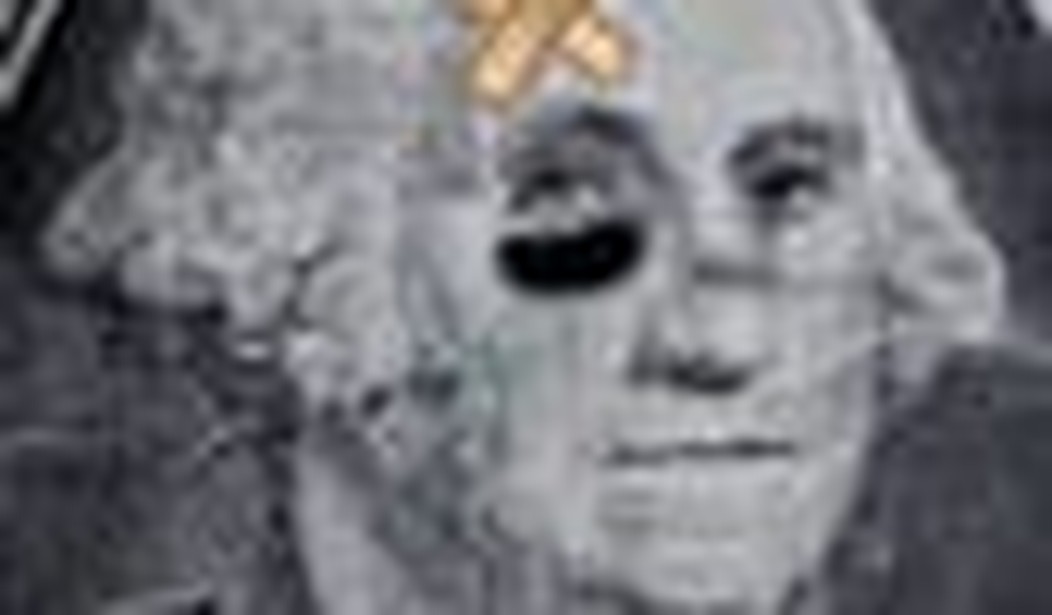In a recent colloquium at the National Archives in Ottawa on the subject of multiculturalism and the advancing subversion of the West, the question arose as to why the most advanced and preeminent civilization the world has ever seen appears to be imploding. It is in every respect stronger than its enemies and competitors and yet is clearly faltering, insecure in its purposes, given to appeasement and self-doubt, and dismissive of its own unmatchable history. Many reasons have been put forward for what is plainly an inward decline, from the natural inevitability of civilizational decay to the loss of religious faith and moral conviction to the apathy and narcissism of a flaccid and materially pampered citizenry.
Muslim author Salim Mansur, whose new book Delectable Lie was the focus of the discussion, steered a different tack, suggesting that our fate might be explained by two iconic figures from literature, Oedipus and Hamlet. This is a provocative insight that needs to be unpacked. Both are royal leaders, one a king and the other a prince in succession to the throne. Both wish to purge their kingdoms of corruption, sickness, and the scourge of illegitimacy. Both are driven to find and expose a buried truth so that the realm may be healed and purified.
Herein lies the problem and the paradox, for in seeking to disinter what is hidden or suppressed, both Oedipus and Hamlet in their diverse ways bring disaster upon themselves, one as a result of a relentless pursuit and the other owing to relentless reflection. One acts and the other fails to act, but the consequences are no less destructive: blindness and death.
If I understand him aright, Mansur’s point is that the central strength of Western civilization is also its attendant weakness, namely, contradictory as this may initially sound, the fostering of critical thought. The valorizing of the concept of truth and the search to discover it rather than adhere to a dogmatic authority which declares without evidence what a people are to believe and to accept as indisputable — or in a current formulation, “the science is settled” — represents the best that civilization has to offer. The conflict between truth and doctrine is, of course, inherent in Western civilization, but the steady progression, despite innumerable setbacks, toward the vision of the European Enlightenment and the legacy it bequeathed to the modern age was ultimately unstoppable. The problem is that the search for truth can — and does — issue in calamitous revelations, as with Oedipus, or in prolonged introspection leading to inaction, as with Hamlet.
If we examine the intellectual and political history of the West from the Enlightenment to the present day, it becomes obvious that Mansur’s theory is persuasive. The Oedipal pursuit of truth conducted by some of the celebrated philosophical minds in the West has led to the destabilizing and ironic conclusion that there is no such thing as “truth.” The pivotal tenet of Friedrich Nietzsche’s The Genealogy of Morals, the source of the postmodern movement in contemporary academic thought and scholarship, is that “there are no facts, only interpretation.” In What Is History, E.H. Carr defines the study and writing of history as a “hard core of interpretation surrounded by a pulp of disputable facts.” French post-structuralist Michel Foucault, in works like The Order of Things and The Archaeology of Knowledge, claims that what we call truth is only the expression of dominant power relations that control the cultural semiotic, or “episteme.” In Of Grammatology, Jacques Derrida, the founder of the “Deconstructive” school of thought, which has infected the curriculum of the Humanities in European and American universities, notoriously argued that “origins” are infinitely recessive and that words appeal not to facts but to other words—what he designates as différance, suggesting both deferral and difference. His colleague, the Belgian scholar Paul de Man whose Allegories of Reading has had an equally deleterious affect on intellectual life, developed the notion of “rhetorical slippage,” the imp that inhabits language and sees to it that we can never say what we mean or even determine what we mean in the first place.
These are only a few of the names among the burgeoning caste of iconoclasts, schismatics, deconstructors, nihilists, post-structuralists, post-modernists and post-whateverites who have embarked on a campaign to undo the heritage of Western culture. This revisionist movement has been massively influential and, indeed, instrumental in preparing the way for the plague of cultural relativism from which we suffer today. Oblivious to the inconsistency intrinsic to such thought—that their argument is invalidated by the very position they have adopted respecting truth claims—these anti-cognitive guerrillas have nonetheless distorted a fundamental element of Western thinking: that truth is discernible. The Oedipal search for truth has paradoxically undermined and eviscerated the cultural investment in the epistemological quest for truth itself and those who have sought the grail will find themselves holding a Styrofoam cup. A virtue has become a vice.
A similar result flows from what we might term the Hamletic inquiry into the “problem” of truth, which differs from the Oedipal enterprise in that Hamlet is more preoccupied with the action to be taken in the wake of his conclusions. Once the truth is discovered—Hamlet is no relativist—how is one to proceed? Is violent intervention called for? Or protracted diplomacy? Or continued investigation to ascertain if the “truth” conceals yet more intricacies that must be isolated, turned over and over, examined for minute distinctions that require yet further study before settling upon a course of action? The outcome is that there is no outcome but only more reflection and intellectual stasis—until the moment arrives when it is too late to respond effectively to a growing peril or an imminent disaster.
We can observe this access of dysfunctional inertia, this phlegmatism of the mind, conspicuously at work in our politicians and diplomats, who cannot bring themselves to determine upon a sensible, coherent and effective mode of action in the face of pressing complexities. Admittedly, they are sometimes capable of reacting, but their reactions resemble reflex gesticulations or autonomic responses that generally make things worse. The American president lunging into Egypt and Libya is a perfect example of such immediate buffoonery. What we note on such occasions is the glaring absence of thought.
For the most part, however, our leaders are like lower-class Hamlets, the proletarians of impotent rumination. Unable to decide upon a rational and meaningful reply to unfolding events, they continue either to vacillate or to remain numb and torpid, engaging in one or another form of self-justifying evasion. More committees must be struck, more “talks” must be held, more time is needed, and more “resolutions” must be compiled and passed whose words die on the page and vanish unmourned. Hamlet, of course, said it best:
And thus the native hue of resolution
Is sicklied o’er with the pale cast of thought,
And enterprise of great pitch and moment…
…lose the name of action.
And William Blake crystallized the notion in The Proverbs of Hell: “He who desires and acts not, breeds pestilence.”
The West now finds itself the victim of its own essential and defining quality as a civilization. Unlike the civilizations of the Orient, Western thought at its best and most characteristic is engaged in the noble adventure to seek out truth, which accounts for the major scientific breakthroughs of the modern era, a stellar literature and grand historiographic projects that attempt to probe and comprehend the vast currents of world events. In the course of time the quest inexorably begins to undermine its own foundations, finding that truth is asymptotic, ultimately inaccessible or even non-existent on the one hand, or on the other, that it demands ever-prolonged investigation either because it is insolubly complex or because the seeker subjectively fears the consequences it entails.
The result is a kind of intellectual embolism, a clotting of the arteries of thought. The modern Oedipus concludes that the truth is that there is no truth—this is the nowhere land his inquiries have taken him to. His conduct is thus based on whim, appetite, fantasy or ungrounded hope and usually culminates in disaster. The modern Hamlet refrains from proceeding in order to avoid compromising himself or losing the perquisites he may have to surrender by committing to a distinct and irreversible course of action. His condition of lassitude or paralysis also tends to culminate in disaster. And this is pretty well where the West finds itself today, between the Scylla of nihilism and the Charybdis of passivity.
If I am not mistaken, this is the brunt of Mansur’s thesis. And he would likely agree that, barring a far-reaching cultural reorientation, there is no way out of this dilemma—in the “true” etymological sense of the word. What would be needed is a genuine educational revolution, a neo-Enlightenment, in which the twin vices of hubris and lethargy are eradicated and the twin virtues of humility and courage could take root: the humility to acknowledge that there is such a thing as discernible truth existing outside the narrow and confining circle of rampant subjectivity, and the courage to act decisively when circumstances leave us no plausible alternative.
Perhaps only a profound crisis or debacle, a calamity we cannot escape in which our lives and our society are threatened with collapse or military defeat and we are brought to the brink—perhaps only this can issue in the restoration of common sense and a determination to retrieve what made us great. Perhaps only the advent of catastrophe can rescue an Oedipus gone awry or a Hamlet gone rogue, one having gone too far and the other not far enough.










Join the conversation as a VIP Member